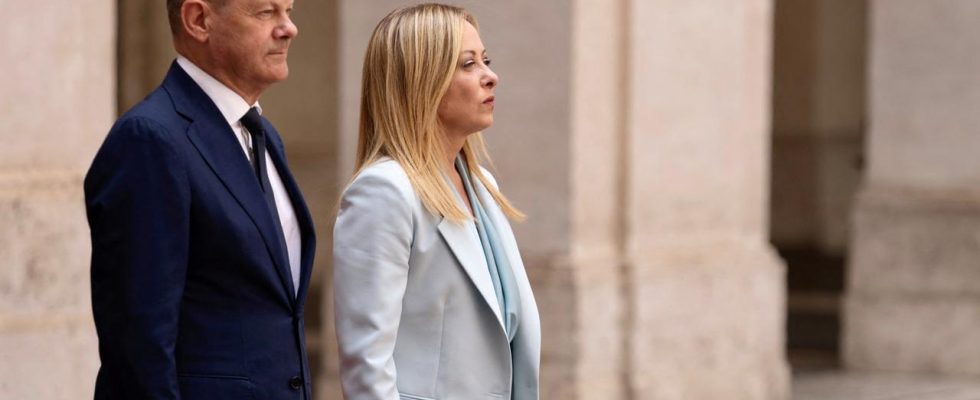Despite some differences, the Italian Prime Minister Meloni and Chancellor Scholz got along surprisingly well. Scholz even wants to expand relations with Italy.
They had something to say to each other. Italian Prime Minister Giorgia Meloni and Chancellor Olaf Scholz talked to each other “privately” for more than an hour – four times longer than planned. Excessively exceeding the schedule in this way is considered a positive sign at such meetings.
In the press conference that followed, the Federal Chancellor also acknowledged the good relations between the two countries. Italy is “an important partner and reliable friend” for Germany, because “our countries are closely interwoven – culturally, economically and socially”.
partisan Distance didn’t matter
As at the meeting in Berlin in February, the party-political distance between the social democrat Scholz and the post-fascist Meloni obviously played no role in the talks. For example, both committed themselves to a common European solution in migration policy.
Meloni emphasized the demand that Europe must do more to stop the departure of migrants from Africa to Europe. According to Italy’s head of government, the topic is “defending the external borders, fighting the routes used by people smugglers and promoting legal immigration”. For this it is necessary, said Meloni, to involve the countries of origin and transit “in serious cooperation” and to promise them investments.
Cooperation with North Africa common concern
Meloni was satisfied that she would soon be traveling to Tunisia with European Commission President Ursula von der Leyen and Dutch Prime Minister Mark Rutte to conclude agreements along these lines. Scholz was also positive about this, describing the forthcoming cooperation with countries in North Africa as a common European concern in migration policy.
cooperation takes place point at each other
At the same time, the Chancellor once again made it clear that he would like the states at the EU’s external borders to have a more reliable system for registering migrants. Scholz pointed out that although Germany has no external EU border, 80 percent of people who apply for asylum in Germany and do not come from Ukraine “have not been registered anywhere before”. However, Scholz rejected a “pointing to each other”, saying that “cooperation is appropriate here”.
Italy’s government, on the other hand, is skeptical about the joint European hotspots at the external borders proposed by the EU Commission. Rome considers its own registration centers to be effective enough.
War in Ukraine brings people together
Beyond the lip service to a common European migration and asylum policy, the meeting in Rome also made it clear what currently binds the two politically very different heads of government together: the war in Ukraine. Scholz emphasized that the Russian attack had fundamentally changed the security environment in Europe. That’s why it’s good to discuss together how to react to this turning point:
Together we stand with Ukraine, which we support politically, financially, humanitarianally and with arms and military training. And we do that for as long as it takes.
Almost word for word, Meloni committed himself to helping Ukraine “as long as it is necessary”.
Agreement on German-Italian action plan
Scholz and Meloni agreed today on a German-Italian action plan that had been planned for a long time. It was initiated by Scholz when Mario Draghi was still prime minister in Rome. The action plan is intended to fundamentally improve cooperation between Berlin and Rome – and was intended as a response to the Quirinal treaty that Italy and France concluded two years ago.
The action plan, which is due to be signed in the fall, includes closer cooperation between Germany and Italy in foreign and defense policy, the environment, economic development, education and research policy and migration. On the occasion of the signing of the action plan, there will be a joint meeting of the German and Italian governments in autumn – the first since 2016.

